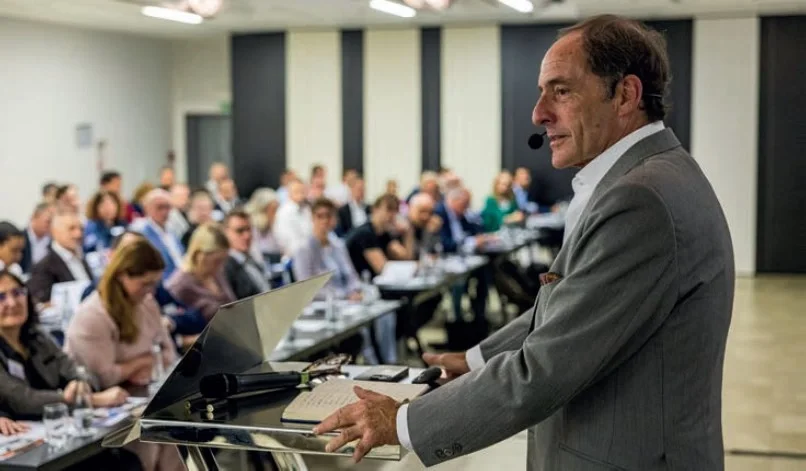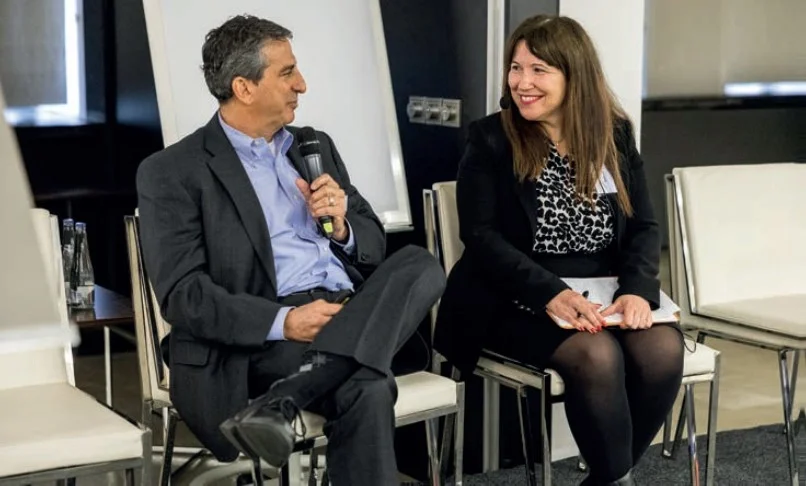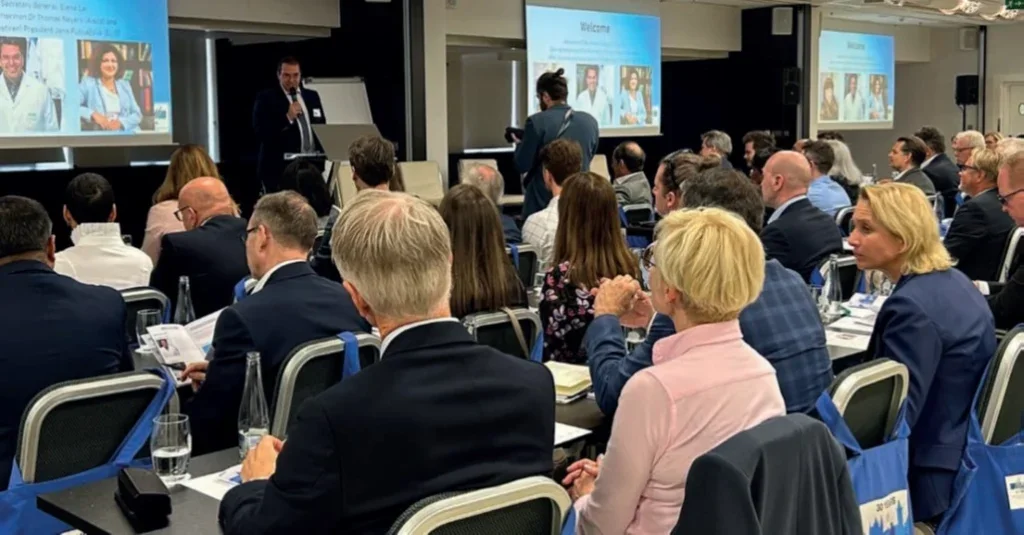
The European Textile Services Association (ETSA) Congress 2024, 2-3 May in Prague, was a particularly special event as ETSA celebrated its 30th anniversary. It is also European Parliament election year, a subject that was not lost among, but rather complementary to, other presentations designed to explore the sector’s essential role in shaping a sustainable, green, and digitised economy for the EU and beyond.
Alongside gaining insights into the EU Green Deal and the Climate Pact, and how they influence the industry, and offering an unrivalled opportunity to network with industry leaders, innovators and peers, Europe’s place in the global scheme of things was also explored.

The geopolitical situation and world economy are experiencing crucial changes with economic downturns in the US and Europe and with China’s ever-growing influence. Geopolitical tensions are not diminishing with energy and climate change continuing to be politically polarising issues, especially before the EU elections in June. In a year of elections which, as well as those for the European Parliament, will witness the USA Presidential contest, and those in India and the UK, the question is, will Europe be heading right or left? As it turned out, there was a definite move right for the EU elections. In India things didn’t go all President Modi’s way, bucking the results of the majority of polls although he still hung on to power. In the UK there was a decisive victory for Labour over the Conservatives in the local and Mayoral elections, as the conference was taking place. But would it be a similar result in the general election in July? The pundits thought yes and they were right as the UK resoundingly elected Labour’s Sir Keir Starmer. Nevertheless, Nigel Farage’s newly launched Reform party gained five seats from disaffected right wing Conservative voters, one more than the Greens.)*

Just five years ago things were jogging along quite comfortably but since then the EU – and the rest of the world – suffered through Covid, came out the other side, and was then hit by conflict on its borders with Russia’s war on Ukraine and then, further afield, the Middle East erupted with Israel and Iran rumbling threateningly at each another even as the Israel and Hammas/ Gaza situation continues to alarm.
Portas, a former deputy Prime Minister of Portugal and Minister of Foreign Affairs, as well as Minister of Defence (2002-2005), was leader of the centreright CDS-PP for 16 years, eight of them while in government and served as an MP for eight terms. He is also a regular commentator on international politics on Portugal TV, and frequent speaker at international conferences. ‘Global Threads: Unravelling the Role of Textile Services in World Affairs’ was his keynote address, and he advised delegates: “Assume risk is a possibility and you will be less surprised.
“We cannot assume we can negotiate this. If no more major events happen, we might have been too excessive in our predictions. Covid ended the longest economic expansion on record. Post Covid it was assumed China would make a big recovery, Germany would go into recession and the US would see stagnation. The truth could not be more different. Only Germany had a recession – not Italy, not the UK. It is now 2024 and it could happen again. Global slowdown is happening but there are many uncertain factors. Geopolitical and geoeconomic tensions are threatening economic global performance in 2024 but the reality may be better than current outlooks predict.

“There are two lessons to learn from this. The US economy will always survive. It has seen 120 months of continuous growth. As for China, it has had a double-digit growth and is still a growing economy, but expect a cycle of less than 5%. China faces sub-5% for three straight years, a record unprecedented since Mao Zedong died in 1976. India will replace China here as it is consistently growing above 5%,” said Portas.
Portas says the ‘social contract’ in China is working. It is a far better life for this generation in exchange for loyalty and obedience “yet 2023 showed a problem – 770,000 apartments had not been sold and there is local and national debt, probably due to youth unemployment”.
Geopolitical instability
“Without US aid Ukraine will lose. Ukraine needs to win but Russia wants to press Ukraine. Ukraine defensive:Russia offensive. If Trump wins, he will probably abandon Ukraine. Putin will have a political victory, not military, and will realise how weak the West is,” he warned.
“We Europeans will have a serious problem. Putin has already made eight interventions in former Soviet Republic countries. Kazakhistan, Tajikhistan; Belarus, Azerbaijan, the Donbass, Crimea and Georgia. He will be looking at Estonia, Latvia and Lithuania. After a constitutional referendum, Putin can stay in power until 2036.
“Then there is the new Gaza war – economic global impact dends in the level of escalation of the conflict. Israel and Iran are both nuclear countries, so this is very dangerous. You have one US President who wants resolution before November, one presidential hopeful who doesn’t.
“A two states agreement is the only solution in Palestine but that is so much easier to say than to organise. They have to recognise each other and embrace a peace agreement but the guys who risked sitting at a negotiating table, namely Sadat and Rabat, were assassinated,” said Portas.
Will there be a trend to de-escalate or will there be conflict, wondered Portas, that will pitch the big maritime sea powers of the US and UK against Iran and the Houthis (Iran by proxy), who are threatening the Red Sea maritime road and thereby targeting global trade. The economic global impact depends on the level of escalation of the conflict, said Portas. “If shipping has to divert it’s going to be more days, more time, more energy. It will cost money but this is not insurmountable. We should be finishing the fight against inflation. However, the decline in inflation is slowing and the delay in cutting interest rates. We will just have to wait. Perhaps European Central Bank will be first – a change in June?”
Portas observed that the EU needs migration, but it needs to be managed, pointing out that Asia and Africa account for more than 80% of global births with Europe and Oceania way behind. Meanwhile, he said, the World Economic Forum (WEF) has significantly adjusted its survey for 2024 and 2025: disinformation and misinformation (including AI) are the top risks it says. Interesting that misinformation and disinformation remains in Table 2 (see below) along with extreme weather events and societal polarisation, cyber insecurity and interstate armed conflict are replaced by three very worrying environmental risks.
Protectionism affects trade
Protectionism jeopardises trade, according to Portas, a policy pursued by ex-US President Trump which only opened the door to the Asia-Pacific trade agreement (RCEP), the world’s largest free trade agreement which went live in January 2022. Nevertheless. Despite discussion between Brazil and Argentina to create a common currency and the UAE exploring the use of rupees to trade non-oil commodities plus Russia and Iran working together to launch a crypto currency backed by gold, few expect to see the end of the dollar’s reign as number one gobal trading currency. Central banks still hold about 60% of their foreign exchange reserves in dollars. This is according to the Atlantic Council, IMF and US Department of the Treasury in 2023.

In the USA, in the ‘poll of polls’, he said, Biden and Trump are running neck and neck in the Presidential elections and that it will all hang on seven key swing states. “The possibility of insurrectionist Trump being elected lets you see the state of the West today. Biden is a centrist in an age of capitalism. The real risk is that Trump does not believe in NATO. Worst of all he does not believe in Article J – when one member is attacked, we all stand together,” he said.
Incidentally, in the E-world charts, out of the 10 leaders, American companies are top with (in this order) Microsoft, Apple, Google/Alphabet, Amazon, Facebook/Meta taking the first five places. Then it is China with Tencent, US with Netflix, China with Bytedance and Alibaba with US Uber at number 10.
“We (Europe) are getting old!” said Portas “Europe innovates less than the USA and China. Don’t expect the world to wait for you. A less regulated Europe could be a good thing. Innovate first, legislate later.”
The view from across the Atlantic
Following on from the presentation by Paulo Portas attendees heard from Joseph Ricci, President and CEO of the North America Association for Linen, Uniform and Facility Services Industry (TRSA), who projected the view from the USA.
He said: “Unfortunately there has been little policy discussion from either President Biden or former President Trump, creating a sense of uncertainty that is bad for business,” said Joseph Ricci, President & CEO, TRSA.
“The Presidential election will directly impact taxes, labour policy, healthcare, immigration, energy and climate policies and regulation, as well as federal agency enforcement and foreign policy. It will be a difficult decision for the American people as a majority of the country, nearly 70%, would prefer two different candidates and both candidates’ approval ratings are at close to 40%. “
As for TRSA gains for its members, the association’s lobbying has resulted in major strides on two important fronts, reported Ricci. On 11 April, TRSA members convened on Capitol Hill for a series of 118 meetings with congressional offices. Their collective dialogue resonated with policymakers, reinforcing the importance of reusable PPE and federal funding support for per- and polyfluoroalkyl substances (PFAS) pretreatment filtration. These discussions took place during the second day of TRSA’s 14th Annual Legislative Conference at The Madison Hotel in Washington, DC.
The collective efforts of TRSA members have already generated momentum. During the 2023 TRSA Legislative Conference, representatives encouraged lawmakers to sign a letter urging the US Department of Health and Human Services (HHS) to study the benefits of reusable PPE and explore avenues for increased adoption. Thirteen representatives endorsed the letter, which was dispatched in June.
At this year’s Hill Day, the TRSA contingent asked Congress to support increasing the operating threshold of reusable textile PPE to a minimum of 50% of healthcare facilities’ inventory. Currently, reusables comprise an estimated 10% of the US market. Increasing that figure would improve environmental protection, save money and enhance supply-chain security while helping to safeguard employee and patient safety.
Some types of PFAS – chemicals found in an array of consumer and industrial products – have been linked by researchers and government agencies to adverse health conditions. This has prompted concerns, including federal standards issued on April 10 that targeted their presence in drinking water. These regulatory mandates for calling for the removal of PFAS from wastewater will result in onerous PFAS-discharge limits to sewers nationwide. Fabric manufacturers are finding PFAS substitutes for garments that now use PFAS to provide barrier properties (for example, for use in infection control and fluid resistance,). Depending on how quickly substitutes are developed and put into service, and what types of PFAS are regulated, a typical linen/uniform laundry could have little choice but to invest in the high-six-figure range or more for pretreatment equipment.
The federal Bipartisan Infrastructure Law (BIL) passed last year allocated $10 billion to EPA for removing PFAS and other emerging contaminants. Congress can establish financial incentives, such as tax credits or grants, to help businesses offset the costs associated with implementing wastewater filtration of PFAS. On Hill Day, TRSA asked policymakers to contact EPA to request that they allocate BIL funds to make such incentives available to our industry.
TABLE 1: WEF GLOBAL RISKS IN THE NEXT TWO YEARS
- Misinformation and disinformation
- Extreme weather events
- Societal polarisation
- Cyber insecurity
- Interstate armed conflict
TABLE 2: WEF GLOBAL RISKS OVER THE NEXT 10 YEARS
- Extreme weather events
- Critical change to Earth systems
- Biodiversity loss, ecosystem collapse
- Natural resources shortage
- Misinformation and disinformation






